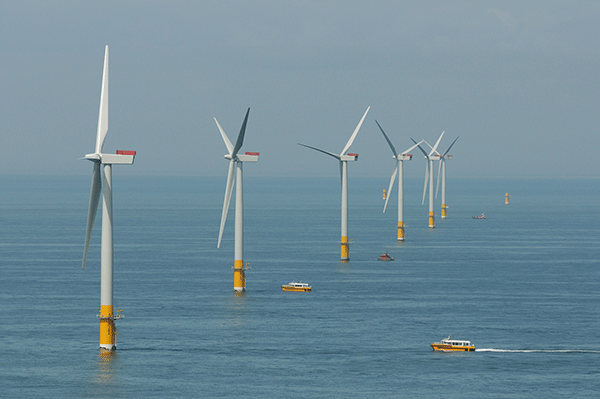Boris Johnson has unveiled a ten-point plan for a green industrial revolution in the UK with particular steps forward in electric vehicles and wind energy but no mention of food and farming.
The plan outlines how £12 billion will create up to 250,000 green jobs and is part of how the UK hopes to become net zero in carbon by 2050.
While nature was included in the plan, the target of planting 30,000 hectares of trees a year has been criticised as too weak, as has the omission of food and farming, where the potential for a sustainable transition has not been recognised.
Critics have also pointed out the comparison in spending on other government projects, such as the £100bn projected cost for HS2 rail.
One of the biggest steps forward appears to be £1.3bn to accelerate the rollout of chargepoints for electric vehicles in homes, streets and on motorways across England.
There will also be £582m in grants for zero or ultra-low emission vehicles to incentivise more people to make the transition, and almost £500m on the mass-scale production of electric vehicle batteries.
In addition, the UK is bringing forward the last date of sale for any new petrol and diesel cars and vans to 2030, ten years earlier than planned.
Other specific funding outlined included £200m to create carbon capture clusters and £1bn on extending the Green Homes Grant voucher scheme by a year. Up to £500m is earmarked for trialling homes heated and fuelled by hydrogen, while £525m will be spent on developing large and smaller-scale nuclear plants.
Gareth Morgan, head of farming and land use policy at the Soil Association said: “The government’s 10-point plan is a step towards greater UK credibility in hosting the COP26 Climate Summit, but the plan’s failure to address how we produce our food is a big gap.
“Food and farming is responsible for a large proportion of UK emissions and failing to recognise this in a climate plan is a missed opportunity to join up the dots between the current climate, nature and health crises.”
“The UK is already well behind on the government’s own tree planting targets and it’s critical for nature and climate that the right trees are grown in the right places. Tree planting can and must play a vital role in a green recovery –agroforestry could support more resilient farming and help restore nature and health.”
Zac Goodall, sustainability and ethics manager at organic veg box company Riverford, said: “3.2 million hectares of the UK is estimated to be covered by woodland and forests. So even at the stated plans for 30,000 hectares of tree planting a year, that’s only increasing our existing woodland by less than one per cent a year.
“The offshore wind plans though, are not to be sniffed at,” he added.

The ten-point plan includes:
– Offshore wind: Producing enough offshore wind to power every home, and quadrupling production by 2030, supporting up to 60,000 jobs.
– Hydrogen: Generating 5GW of hydrogen production by 2030 for industry, transport and homes, and aiming to develop the first town heated entirely by hydrogen by the end of the decade.
– Nuclear: Develop large and smaller-scale nuclear plants.
– Electric vehicles: Accelerating the transition to electric vehicles and the related infrastructure.
– Public transport, cycling and walking: Making cycling and walking more attractive ways to travel and investing in zero-emission public transport of the future.
– Jet Zero and greener maritime: Research projects for zero-emission planes and ships.
– Homes and public buildings: Making homes, schools and hospitals more energy efficient, with a target to install 600,000 heat pumps every year by 2028.
– Carbon capture: Becoming a world-leader in carbon capture technology, with a target to remove 10MT of carbon dioxide by 2030.
– Nature: Protecting and restoring the natural environment, planting 30,000 hectares of trees every year, whilst creating and retaining thousands of jobs.
– Innovation and finance: Make the City of London the global centre of green finance.
Johnson said: “Our green industrial revolution will be powered by the wind turbines of Scotland and the North East, propelled by the electric vehicles made in the Midlands and advanced by the latest technologies developed in Wales, so we can look ahead to a more prosperous, greener future.”













“Innovation and finance: Make the City of London the global centre of green finance.”
Wish I could post more detail, but something tells me this is not going to be straight forward.
Awareness of The Great Reset is slowly rising and there will be pros AND cons.
Questions are being raised about the safety of 5G (some more sensible than others), the internet of things and the Fourth Industrial Revolution.
https://www.localgov.co.uk/The-Great-Reset-Reshaping-transport-for-a-greener-future/50939
Quite a bit to say about Agriculture….there are opposing view points on farming methods. I will try and make a longer post another time.
http://www.babymilkaction.org/archives/23661
https://theconversation.com/the-fourth-industrial-revolution-what-does-wefs-klaus-schwab-leave-out-53049
The Spider’s web
https://www.youtube.com/watch?v=-YgFDZNXPyg
I long for the day when Britain will be a world leader in humility.
Event
City of London Corporation, Green Finance Institute and World Economic Forum convene more than 60 policy and industry leaders to speak at inaugural Green Horizon Summit
https://www.greenfinanceinstitute.co.uk/greenhorizonsummitregistration/
Keeping probing, get on the learning curve and speak up soon.
https://www.independentsciencenews.org/commentaries/gates-ag-one-the-recolonisation-of-agriculture/
I long for the day when Britain will be a world leader in humility.
Nice thought but I wouldn’t hold my breath!
Typical of shambolic Johnson reaching for high tech carbon capture (flue linings/chemical washes etc) and ignoring low tech carbon capture – planting trees!
More greenwash anyone?
I think it is important to concentrate on what can easily be achieved.
Wind power backed up by nuclear power is certainly the way forward for our electricity needs.
Also use the surplus wind power to produce green hydrogen to feed into our gas mains – this can be mixed with natural gas up to concentrations of 20-30% without making nay changes to appliances – the eventual aim would be 100% green hydrogen.
Air sourced heat pumps are an excellent idea but will unfortunately only be practical for new builds.
Green options such as hydrogen fuel cells are now sufficiently developed to power HGV’s, buses and coaches on our roads plus trains and marine transport. – it is a shame that hydrogen powered trains have not be considered for HS2, the capital costs could be slashed.
Hydrogen fuel cells for cars are some way off but they will eventually become the norm – only after the technology has become established for HGV’s buses and coaches.
It will take a while to build fueling stations for hydrogen – the big advantage here is that the green hydrogen can be produced on site, as needed, just using electrical power and water.
The target for tree planting is pitiful and should certainly be increased. As for food production, I guess that policy will become clear after Brexit, but we probably wont like it, especially if we have to put up with US imports.
Amazing – elsewhere in this copy of Wicked Leeks the idea of taxing Red Meat and certain others foods is mooted yet here there is complaint that the government is not doing enough to help those producers of food in this country! Come on please – you can have it one way or another but to quote and old English saying – you can’t have your cake and eat it” – Perhaps there are those who think they can!
the Walrus
Anyone with a grasp of the records of recent Conservative governments on Climate Change mitigation will see through this ten point plan in an instant.
Only £4 billion of the investment is new, and the proposed expansion of nuclear energy goes against the recommendations of the government’s own National Infrastructure Commission. Nuclear energy is not only vastly more expensive than renewable alternatives; it is also fundamentally incompatible with a renewables dominated National Grid that will no longer need a baseload backup.
Recently, the Committee on Climate Change – the government’s designated arbiter of progress on decarbonisation – concluded, “policy ambition and implementation now fall well short of what is required. Last June, we advised that 25 headline policy actions were needed for the year ahead. Twelve months later, only one has been delivered by Government in full. Ten of the actions have not shown even partial progress. Government continues to be off track for the fourth and fifth carbon budgets – on their own appraisal – and the policy gap has widened further this year as an increase in the projection of future emissions has outweighed the impact of new policies.”
Does this latest proposal put the government’s decarbonisation programme back on track to deliver net zero emissions by 2050? No! But our predicament is worse than it might seem. The peer reviewed scientific evidence is clear. The 2050 target is too late without substantial investment in a vast and unproven Carbon Capture and Storage industry. Given current global emissions, the carbon budget consistent with limiting global heating to no more than +1.5 Celsius will be consumed by 2027. To date, Nationally Determined Contributions under the Paris Accords put us on track for over 3 Celsius of global heating by 2100.
Despite some ill judged campaigns, Extinction Rebellion appears to have a point.
An atmospheric scientist.